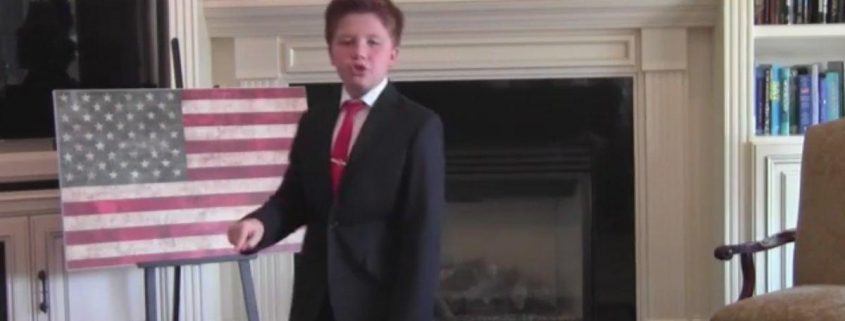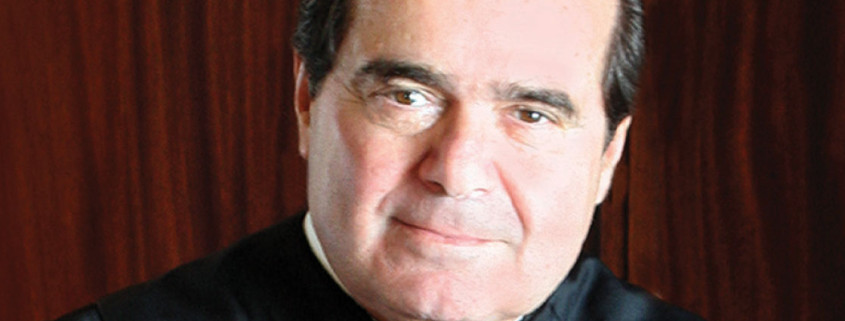By John S. Baker – -April 14, 2015 (Washington Times)
John Strand’s fascinating play, the Originalist, manages to humanize Justice Scalia for those who view him, in the play’s words, as a heartless monster. Beneath the Justice’s combative brilliance, the play shows him to be quite compassionate towards his far-left, lesbian law clerk. But the playwright fails to find the heart of Originalism.
The lead actor, Edward Gero, nails the Justice’s walk, words, and mannerisms. Missing, however, is the Justice’s hearty laughter. But an actor can’t give us what’s not in the script. Actors in a play are textualists— interpreting, yes; but still sticking to the writer’s words. A play is not the place for Improv.
Originalists are textualists who interpret the words actually written in the Constitution – the script. They don’t do Improv.
The play puzzles over the question: how could someone so brilliant be so obtuse as not to realize that the Constitution must be updated to meet modern needs?
The answer provided by the play and some commentators: the Justice’s strict adherence to the words of the Constitution can only be explained in terms of his traditional (read “rigid”) Roman Catholicism.
Religious faith may explain the Justice’s genuine compassion, but certainly not his Originalism.
Originalism venerates neither the Bible nor Church teaching, but words written by Protestants and Deists. The Constitution has long been the scripture for our civic religion. On this point, it is instructive that in the 1830s Supreme Court Justice Joseph Story (a Unitarian) and others borrowed the question-and-answer format of the Catholic catechism and created “Constitutional catechisms.”
America’s civic religion has been eroding for over 100 years under the intellectual influence of Progressivism, as articulated by Woodrow Wilson. Rejecting what he claimed was the Newtonian world view of the Founders and substituting social Darwinism, Wilson provided the political-philosophical basis for the “living” or “evolving” Constitution:
Living political constitutions must be Darwinian in structure and in practice. Society is a living organism and must obey the laws of life, not of mechanics; it must develop. All the progressives ask or desire is permission – in an era when ‘development,’ ‘evolution,’ is the scientific word – to interpret the Constitution according to the Darwinian principle.”
Critics of Originalism may sound persuasive by observing that laws become outdated over time. Statutes certainly can become outdated. Matters likely to become outdated, however, do not belong in a constitution and were not included in our Constitution. Instead, the Constitution provides for changes through the system of Separation of Powers, with Congress making changes in law, as long as the President is willing to accept the changes, and the Supreme Court finds no violation of the Constitution.
Wilson rejected Separation of Powers because it slows down democracy. Indeed, the Framers wanted to make it difficult to pass federal laws. The Separation-of-Powers system necessitates law-making by consensus rather than simple majorities.
Contra Wilson, Justice Scalia both rejects “the living Constitution” and argues for restoring (and annually teaches a course on) the original, rigorous understanding of Separation of Powers.
For Progressives, Justice Scalia’s Constitution represents a throwback in terms of Darwinian progress. What matters for them is the expansion of rights, not the structure of the Constitution
Americans may be conflicted. They generally want the Court to follow the words of the Constitution, but they tend to equate the Constitution with the Bill of Rights. As Justice Scalia often says, however, the Bill of Rights is only “the icing on the cake.” Without Separation of Powers, including an independent judiciary, the Bill of Rights would mean nothing more than words on paper. The former Soviet Union and other despotic regimes have had wonderfully written, but meaningless, bills of rights.
Americans would do well to recall that the heart of the Constitution is its structure of Separation of Powers and Federalism. The structure and the powers it grants, limits, and divides among the branches of the federal government never become outdated. The powers to tax, to borrow money, to regulate commerce among the states, to raise and support armies, etc., will be essential as long as the country exists.
Originalism venerates neither the Bible nor Church teaching, but words written by Protestants and Deists. The Constitution has long been the scripture for our civic religion. On this point, it is instructive that in the 1830s Supreme Court Justice Joseph Story (a Unitarian) and others borrowed the question-and-answer format of the Catholic catechism and created “Constitutional catechisms.”
America’s civic religion has been eroding for over 100 years under the intellectual influence of Progressivism, as articulated by Woodrow Wilson. Rejecting what he claimed was the Newtonian world view of the Founders and substituting social Darwinism, Wilson provided the political-philosophical basis for the “living” or “evolving” Constitution:
Living political constitutions must be Darwinian in structure and in practice. Society is a living organism and must obey the laws of life, not of mechanics; it must develop. All the progressives ask or desire is permission – in an era when ‘development,’ ‘evolution,’ is the scientific word – to interpret the Constitution according to the Darwinian principle.”
Critics of Originalism may sound persuasive by observing that laws become outdated over time. Statutes certainly can become outdated. Matters likely to become outdated, however, do not belong in a constitution and were not included in our Constitution. Instead, the Constitution provides for changes through the system of Separation of Powers, with Congress making changes in law, as long as the President is willing to accept the changes, and the Supreme Court finds no violation of the Constitution.
Wilson rejected Separation of Powers because it slows down democracy. Indeed, the Framers wanted to make it difficult to pass federal laws. The Separation-of-Powers system necessitates law-making by consensus rather than simple majorities.
Contra Wilson, Justice Scalia both rejects “the living Constitution” and argues for restoring (and annually teaches a course on) the original, rigorous understanding of Separation of Powers.
For Progressives, Justice Scalia’s Constitution represents a throwback in terms of Darwinian progress. What matters for them is the expansion of rights, not the structure of the Constitution
Americans may be conflicted. They generally want the Court to follow the words of the Constitution, but they tend to equate the Constitution with the Bill of Rights. As Justice Scalia often says, however, the Bill of Rights is only “the icing on the cake.” Without Separation of Powers, including an independent judiciary, the Bill of Rights would mean nothing more than words on paper. The former Soviet Union and other despotic regimes have had wonderfully written, but meaningless, bills of rights.
Americans would do well to recall that the heart of the Constitution is its structure of Separation of Powers and Federalism. The structure and the powers it grants, limits, and divides among the branches of the federal government never become outdated. The powers to tax, to borrow money, to regulate commerce among the states, to raise and support armies, etc., will be essential as long as the country exists.
Like Justice Scalia, the framers focused on structure. They invented the novel doctrine of a federal judiciary having a power to declare laws unconstitutional. They did so to preserve the Constitution as written against the power-grabbing tendencies of the political branches in the federal and state governments.
At its heart, Originalism is grounded in the Framers’ understanding of human nature and power. It rejects the Progressive belief that human beings have so progressed that the Constitution’s structural restraints are no longer necessary to curb the self-interested behavior of those holding – and seeking more—power. As one observer once said, “Scalia does not have a sanguine view of human nature or much confidence in social progress.” Nor did the Framers.
John S. Baker, Jr., Ph.D. is Visiting Professor, Georgetown University Law Center and Professor Emeritus, Louisiana State University Law Center.



